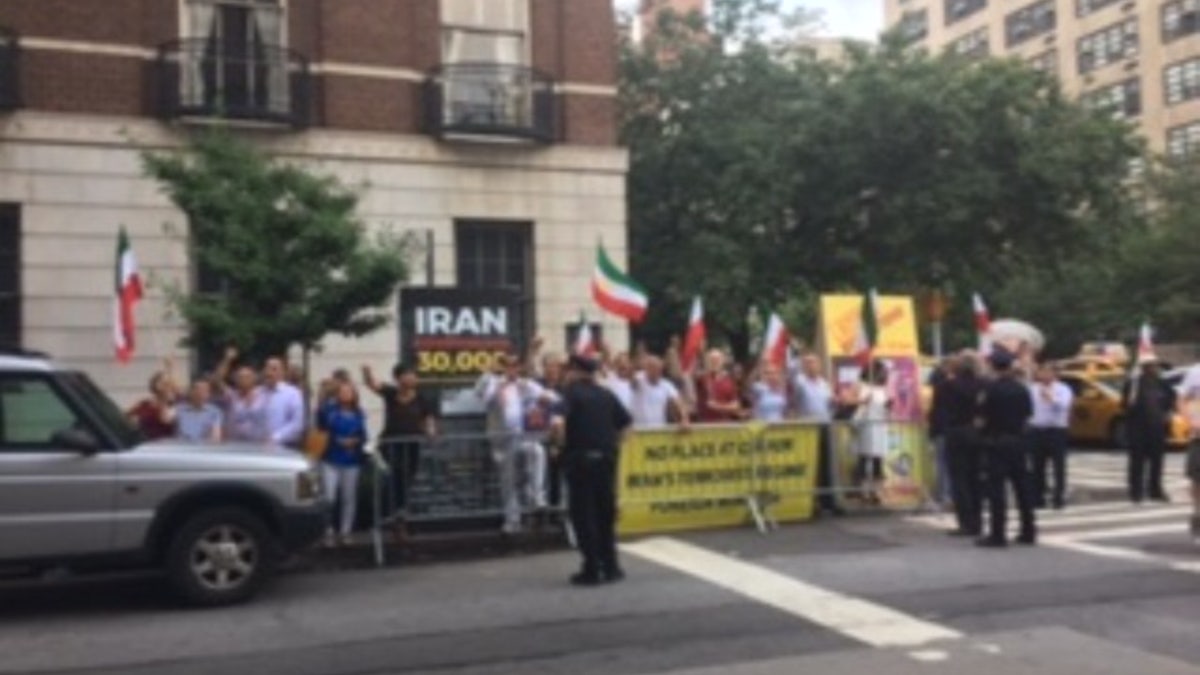
FILE - In this file photo dated Sunday, Oct. 2, 2016, Iranian Foreign Minister Mohammad Javad Zarif answers questions from lawmakers in an open session of parliament in Tehran, Iran, explaining the nuclear deal with world powers. Iran is to receive a huge shipment of natural uranium from Russia to compensate it for exporting tons of reactor coolant, according to unidentified Iranian diplomats Monday Jan. 9, 2017, in a move approved to keep Tehran committed to a landmark nuclear pact. (AP Photo/Vahid Salemi, FILE) (The Associated Press)
Iran's Foreign Minister Mohammad Javad Zarif said Monday that his country has an entirely "independent judiciary" set in stone in its constitution, and deflected the notion that he or the government had much immediate authority in helping free the jailed Chinese-American graduate student Xiyue Wang.
"But we hope an acceptable resolution can be found," Zarif said at the Council on Foreign Relations in New York City. "There are Iranians being detained (by the U.S.) on charges of sanction violations that are not applicable today... for bogus and purely political reasons."
Wang, who was in Iran working on his Princeton University thesis on Eurasian history, was sentenced over the weekend to ten years behind bars for "spying," in a trial that was held behind closed doors.
Zarif also expressed his skepticism that the Syrian regime, led by embattled President Bashar al-Assad, had used chemical weapons in the country's northwestern rebel-held town of Khan Sheikhoun in April this year, despite certainty from U.S officials and other international bodies.

Protesters outside the Council on Foreign Relations in New York City. (Fox News)
"I have serious doubts... And no one has a red-line (on the use of chemical weapons more than Iran. When we were victims, nobody cared," he said, referencing the Iran-Iraq war in which Iraq's dictator Saddam Hussein dropped an array of chemical concoctions on Iranian combatants and non-combatants in the 1980s.
Zarif went on to blame both "foreign intervention" and the failure of Arab governments to provide their people with their "basic needs," as the key reasons for all the anger and frustration that has led to the rise of extremism in the Middle East.
Zarif, who was in New York for a high-level United Nations meeting on sustainable development and to "see old friends," also used the platform to tout Iran's "democracy," and the resilience of the Iranian leadership and its people.
VIDEO: IRAN SENTENCES AMERICAN GRAD STUDENT TO PRISON
"People lined up for ten hours to vote, and in Los Angeles they lined up for four hours to vote (in the recent election) as this was their Avenue to express themselves," he continued. "Gen. Mattis said that Iranians don't have a choice, but why would people stand in line for ten hours for a president that was pre-determined? Come on. Don't kid yourselves."
Zarif also called the current fighting in Yemen the "worst humanitarian nightmare you can think of" and said he hoped it would not escalate into full-scale war between Iran and Saudi Arabia.
"We certainly hope that if we don't agree with each other about the situation in Yemen or about the situation in Syria we can still work with each other in order to bring those situations to an end," he noted.
Saudi Arabia launched an ongoing bombing campaign on its border with Yemen over two years ago, with U.S support, after Houthi rebels believed to be backed by Tehran took control of large swaths of the country including the nation's capital, Sana'a.
PRINCETON DEFENDS STUDENT SENTENCED IN IRAN
The top official also shunned reports that Iran effectively controlled Iraq post the U.S.-led invasion, instead mandating that his government is against the presence of foreign militaries anywhere in the region. He stated that Iranian groups are merely in military "advising" roles in both Iraq and Syria, at the invitation of both sovereign governments, and that they offer support only when asked.
Zarif pointed out that when the Islamic State terror network was close to encroaching the semi-autonomous Kurdish region in Iraq in 2014, its president, Masoud Barzani, made three calls for help -- to the U.S., Turkey and Iran -- and it was Iran who came to their assistance in just two hours with advisors and planes of weaponry.
"Foreigners should assist, anything beyond that is destabilizing," he said.
Zarif also suggested that while the U.S. has simply and unjustly now chosen Iran as its "enemy of choice" and he and Secretary of State Rex Tillerson have so far had no direct communication, he is open to fostering relations.
The minister additionally indicated that Israel is not Iran's immediate concern, but expressed dismay over the continued "repression of the Palestinian people" and denied that Iran was developing missiles to carry nuclear warheads, which is prohibited under the reigning nuclear deal.
"We need them to make sure that another Saddam Hussein around the corner will not come and hit us again," he said, reiterating several times that Iran is committed to never producing nuclear weapons even after the deal expires in just over ten years.
"We will continue to produce enriched uranium," Zarif said, "for fuel purposes."
His address Monday was met with a small group of around twenty protestors outside carrying signs and chanting their anger towards Iran's human rights abuses, a concept that the minister also vehemently dismissed. Zarif said that he found it somewhat odd that Iran is singled out by the U.S. as human rights abusers when there are countries that have "never heard of elections" and go on "beheading" their citizens but a deemed American allies and have never had sanctions imposed on them.




















